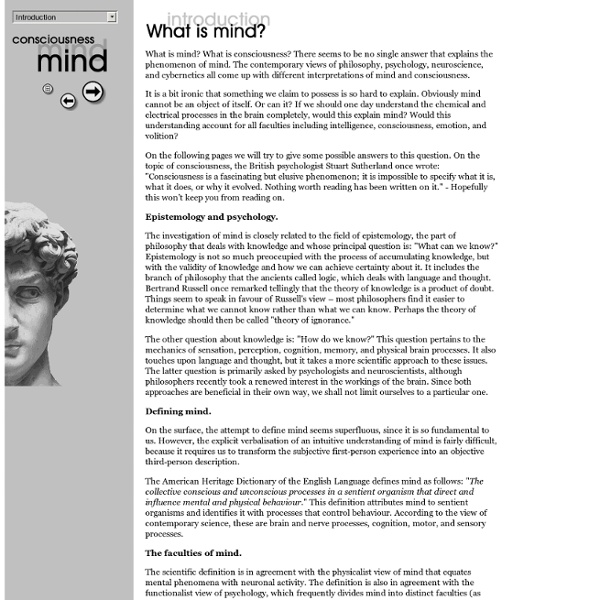



http://www.thebigview.com/mind/
Shyness Shyness (also called diffidence) is the feeling of apprehension, lack of comfort, or awkwardness especially when a person is in proximity to other people. This commonly occurs in new situations or with unfamiliar people. Shyness can be a characteristic of people who have low self-esteem. Stronger forms of shyness are usually referred to as social anxiety or social phobia. The primary defining characteristic of shyness is a largely ego-driven fear of what other people will think of a person's behavior, which results in the person becoming scared of doing or saying what he or she wants to, out of fear of negative reactions, criticism, rejection, and simply opting to avoid social situations instead.[1]
The Power Of The Mind: How To Train Yourself To Be More Successful : Managing How can you use the latest discoveries in brain science to improve your life? Here are some techniques. November 02, 2011 Leadership tycoon Warren Bennis once said, “We seem to collect information because we have the ability to do so, but we are so busy collecting it that we haven’t devised a means of using it. The true measure of any society is not what it knows but what it does with what it knows.” Philosophical Quotes, Thought-Provoking Sayings Related Quotes Hmmm Philosophy Truth Wise Words We are more often treacherous through weakness than through calculation. ~François VI de la Rochefoucault
Maslow's hierarchy of needs Maslow's hierarchy of needs, represented as a pyramid with the more basic needs at the bottom[1] Maslow's hierarchy of needs is a theory in psychology proposed by Abraham Maslow in his 1943 paper "A Theory of Human Motivation" in Psychological Review.[2] Maslow subsequently extended the idea to include his observations of humans' innate curiosity. His theories parallel many other theories of human developmental psychology, some of which focus on describing the stages of growth in humans. Maslow used the terms "physiological", "safety", "belongingness" and "love", "esteem", "self-actualization", and "self-transcendence" to describe the pattern that human motivations generally move through. Maslow's theory was fully expressed in his 1954 book Motivation and Personality.[5] The hierarchy remains a very popular framework in sociology research, management training[6] and secondary and higher psychology instruction. Hierarchy
How to Develop a Sound Mind A sound mind in a sound body, is a short, but full description of a happy state in this World: he that has these two, has little more to wish for; and he that wants either of them, will be little the better for anything else. – John Locke There are a number of diverse issues that could alter our wellbeing / contentment — entailing aliment, standard of living, workout routines, anxiety, family, and line of business et al. However, the principal aspect that frequently gets ignored is the strength of the mind. Sound mind is the gateway to form / sustain an active and cheerful life. An Essay by Einstein "How strange is the lot of us mortals! Each of us is here for a brief sojourn; for what purpose he knows not, though he sometimes thinks he senses it. But without deeper reflection one knows from daily life that one exists for other people -- first of all for those upon whose smiles and well-being our own happiness is wholly dependent, and then for the many, unknown to us, to whose destinies we are bound by the ties of sympathy.
Personality Quiz - StumbleUpon VisualDNA brings a new layer of information to the world of technology that will help bring it closer to the people who use it – making it more enjoyable and relevant. Technology provides businesses with a surfeit of DATA – what and when. However it provides very little in the way of UNDERSTANDING – who did things, and why they did them. We see this effect in all areas of business from marketing to financial services. Despite all the targeting and site metrics, digital marketing isn’t getting any more effective. How to train your mind to remember anything Josha Foer observed the 2005 USA Memory Championship and won it in 2006He says you can teach yourself to remember a lot of information effectively One of the keys is to associate a word or a fact with other things you remember, Foer saysFoer: "If you want to make something memorable, you first have to make it meaningful" Editor's note: Joshua Foer is a writer and the author of "Moonwalking With Einstein: The Art and Science of Remembering Everything." In 2005, he attended the USA Memory Championship as an observer.
How Not to Be Offended Editor’s note: This post was written by Shemsi Prinzivalli. There is an ancient and well-kept secret to happiness which the Great Ones have known for centuries. They rarely talk about it, but they use it all the time, and it is fundamental to good mental health. This secret is called The Fine Art of Not Being Offended. In order to truly be a master of this art, one must be able to see that every statement, action and reaction of another human being is the sum result of their total life experience to date. In other words, the majority of people in our world say and do what they do from their own set of fears, conclusions, defenses and attempts to survive.